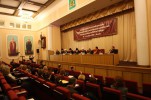Religious communities confer in Moscow on preventing AIDS and helping people with HIV
18.11.2008 · Архив 2005-2009, События
An interreligious conference on Cooperation between Religious Confessions in Russia in the Area of HIV/AIDS began its work on November 18, 2008, at the conference hall of the Danilovsky Hotel in Moscow. Among its participants are members of the Presidium of the Interreligious Council in Russia and their representatives including Metropolitan Kirill of Smolensk and Kaliningrad, head of the Moscow Patriarchate’s department for external church relations, Mr. Zinoviy Kogan, president of the Congress of Jewish Religious Communities and Organizations in Russia, the Ven. Sanjay-lama, Moscow representative of the Buddhist Traditional Sangya in Russia, Mufti Albir Kyrganov of Chuvashia, Mr. Kharis Saubianov, vice-chairman of the Muslim Board for the European Russia, and V. Engel, executive director of the Federation of Jewish Communities in Russia.
The conference is also attended by representatives of Christian confessions in Russia including Archbishop Paolo Pezzi, ordinary of the Roman Catholic Archdiocese of the Mother of God in Moscow, Yu. Sipko, chairman of the Union of the Evangelical Christian Baptists in Russia, V. Samoilov, head of the HIV-AIDS Interconfessional Coordinating Committee, as well as representatives of state structures and public organizations, among them Sasha Graumann, deputy permanent representative of the UN Development Program in the Russian Federation, I. Leshkevich, deputy head of the Moscow City Public Health Department, Ms. L. Shoigu of the Russian State Duma Healthcare Committee, Major General Golubovsky, head of the Third Russian Federal Drug Control Department, and others.
Opening the forum His Eminence Kirill called upon the participants to consider the religious and moral aspects of problems facing society today and the problem of spreading of AIDS as one of them. Indeed, he said, ‘a society stricken by moral illnesses is doomed to degradation and ultimately death’, adding that ‘the state of public morality is a matter of public significance. It is a question of the future, nature and prospects of a country’.
He pointed to the state of school today and the impact of the mass media, especially television, as causes of the spiritual crisis in society. However the fundamental reason for the spreading of HIV/AIDS lies in a crisis of the Russian family. ‘It is the family that traditionally has been the guardian of moral principles, values, behavioral standards and life strategies for children and youth. It is the family that has also turned out to be the principal target of destructive processes progressing in our society’, he said.
‘At the same time, what we see again are attempts to treat symptoms rather than the principal illness. We as representatives of traditional religions in Russia should use all our influence and resources to draw the attention of the authorities and the people to the cause of the illness. The spreading of HIV/AIDS is one of those strokes of the bell which call us all to active dialogue for considering the moral model of Russia’s social development’, the metropolitan said.
The conference has been initiated by the Interreligious Council in Russia with the aim to establish cooperation between traditional religions in Russia in preventing the spreading of AIDS and helping people living with HIV.
During the first day of the forum, religious leaders spoke of the views held by various religions on the problem of AIDS and stories were exchanged about people living with HIV, while representatives of municipal and public organizations dealt in their reports with problems involved in preventing the spreading of HIV and rendering palliative aid to people living with HIV/AIDS.
After the first plenary session, participants answered questions from journalists representing both religious and secular mass media.
The conference will conclude its work on November 19. It is planned to adopt a final document defining the major areas for cooperation between religious communities in the area of HIV/AIDS.
DECR Communication Service


